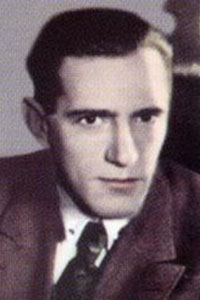The History of Georgi Vinogradov

Born: 16 Nov 1908
Died: 11 Nov 1980
Russian Tenor.
The greater part of the career of Gorgi Vinogrado was in fact pursued in the fields of broadcasting and concert recital. A Russian, Richard Crookes, you like.
A native of Kazan, he studied the violin and viola there, later joining the Military Signal Academy, where he participated in various amateur musical activities.
He began to be heard over the radio and soon came to have a wide national following for his performances not only in opera but in German Lieder and Russian song.
His stage roles were mostly confined to the lyric Russian roles but in addition he sang in Mozart’s Don Giovanni, Ambrose Thomas Mignon and Zandonais’ Francesca de Réminy.
To begin with let’s hear him in that unusual and difficult aria from Mirsovki’s Soroschinsky Fair, where for long periods the singer is unaccompanied with the voice and technique completely exposed.
And then the ideal Mignon from Tomas Obrer, a perfect vehicle for this elegant tenor.
Song – Georgi Vinogradov
Song – Georgi Vinogradov
Vinogradov certainly did sing in the West because I had the pleasure of hearing him in St. Andrew’s Halls in Glasgow during the 50s.
This was during the peak period of the so-called “Cold War”, a very chilly period indeed. It was also the period when the Scottish USSR Friendship Society was most active in trying to improve relations between our two countries.
I was an enthusiastic supporter of this aim and outcome of which usually found me in attendance at all the concerts sponsored by the organisation and what concerts they were.
The Russians were out to make an impression and sent over some of their finest artists, acts from the Moscow State Circus later to become world famous, the best dancers and players from the various Soviet republics aquired from from the Red Army and Navy again to become world famous.
Best of all for my own preferences, dancers and singers and concert actors from the highest strata of Soviet culture, the academies in the Kirov and Bolshoi companies. And of course, I never forgot a name. So when the records did eventually appear through the mist, I was able to pounce.
Two unforgettable moments I simply must mention.
Hamilton Town Hall, a mix-up, only one artist appears at the concert, the rest are in Glasgow. An old grand piano is wheeled in, the meager audience sits cold and shivering in the winter evening, a light applause often at the wrong places, much disappointment among the audience, only one artist and a piano player hardly worth the half crown, the player Emil Gilels.
Holytown stationed on a winter’s night. The lonely figures on the opposite platform stare in utter amazement at a small waiting room on the other side. There appears to be impromptu concert taking place. Suddenly, as to pervert baritone voice comes floating out of the night in such strange words. Never will I forget the look on those faces. Deep Ravenza, Eugene Bellaw, baritone of the Balshoy Opera, awaiting with the rest of the group the late train to Edinburgh for their next stop, and passing the time with us singing and playing their party pieces.
So to conclude, you will excuse me if I indulge myself by playing a record of a Russian song sung by Evgeny Gradov and Andrei Ivanov.
Another singer, I had the great pleasure of hearing at these concerts. In memory of those happy but difficult times.
Song – Georgi Vinogradov

The History as it was Recorded
Sydney Rhys Barker
